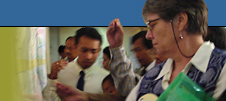|
||
 |

|
 |
|
|
The Ripple Project The Ripple Project tracks and documents what happens before, during and after future searches; tracing the ripples among organizations and individuals over time. All documents are accessible to Future Search Network Members through our on-line data bases and archives. We have learned that future search often leads to unpredictable, positive outcomes that may have impact for months or years following a conference. Sometimes little or no follow up action takes place. We want to understand and highlight the differences between more and less successful future searches. What do we mean by success? Here's one example of the "ripple effect." In 1995, a future search in Ko'olau Loa, Hawaii was held to create a healthy community among several towns previously separated from each other. This led to a High School conference from which emerged major curriculum revisions to incorporate traditional Hawaiian values. A pre-school child care center was set up, health screening systems initiated and young people added to the neighborhood associations. Several local residents took on the task of integrating traditional Hawaiian and Western medical practices. Eventually Brigham Young University in Hawaii introduced a new program in Hawaiian culture. The local hospital held its own future search and found a way to avoid shutting down. Residents formed a non-profit association that has become a permanent structure for community betterment. All of these "ripples" can be identified with the original future search. (Some are documented in an article by Janoff and Weisbord published in Health Care Forum Journal.) Any Future Search Network member can join the Ripple Research project and have her or his work included in our library with full credit. Researchers choose their own study methods: interviews, culling through documents, surveys, questionnaires or first-hand observation. |
|
|
|
home | introducing
the network | what is fsn? | network activities | membership |